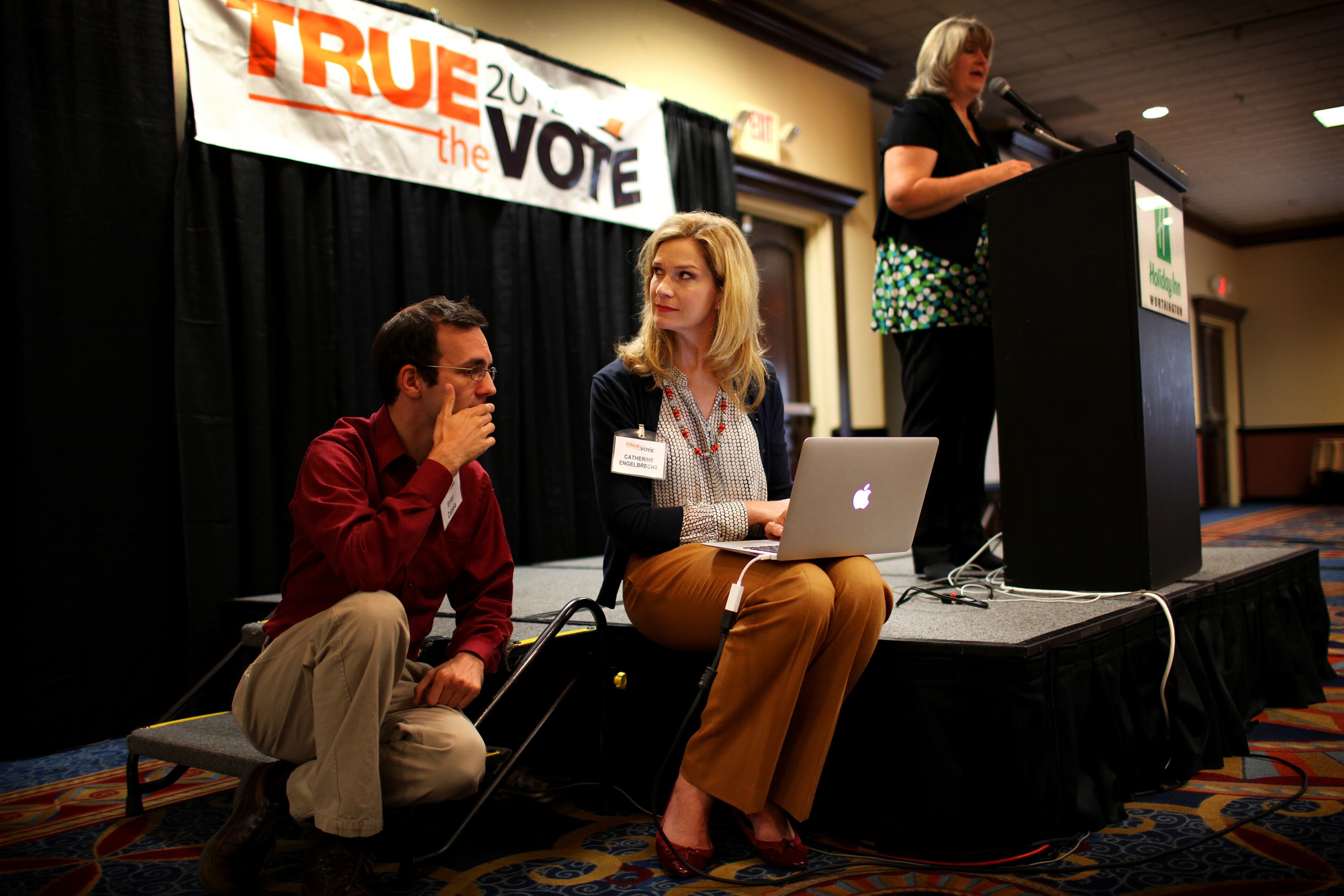Conservative challenges of voters’ eligibility to be put on trial in Georgia

In the tumultuous weeks before Georgia’s 2021 U.S. Senate runoffs, the conservative group True the Vote and its allies challenged the eligibility of 250,000 voters, offered a $1 million “bounty” and recruited Navy SEALs to oversee polling places.
Did those efforts amount to illegal voter intimidation? A trial opens Thursday to answer that question in a federal courtroom in Gainesville.
The court drama pits True the Vote, the force behind the election conspiracy movie “2000 Mules,” against Fair Fight, the liberal voting rights group founded by Democrat Stacey Abrams that filed the lawsuit nearly three years ago.
Fair Fight alleges that True the Vote violated the Voting Rights Act, which prohibits intimidation, threats or coercion of any person for voting or attempting to vote. Fair Fight asked the judge to ban True the Vote from operating in Georgia and from targeting the state’s voters in the future.
“Mass challenges by anti-democratic conspiracy peddlers ... are part of a coordinated nationwide effort to make administering elections more difficult while intimidating and harassing voters,” Fair Fight Executive Director Cianti Stewart-Reid said.
In True the Vote’s defense, the group says it followed a Georgia law that allows citizens to question the eligibility of their neighbors. True the Vote says its goal was to enlist patriotic residents, such as members of the military, to ensure that only legitimate voters cast ballots.

“True the Vote’s mission is to help citizens, including veterans, lawfully engage in a wide variety of election integrity efforts,” said Catherine Engelbrecht, the organization’s founder. “In contrast, Fair Fight has repeatedly filed lawsuits against us and others to prevent lawful election integrity efforts, baselessly alleging racism and intimidation.”
True the Vote initially announced in December 2020 that it would challenge the over 364,000 potentially ineligible voters based on public records that indicated they might have moved. Ultimately, Georgia activists who coordinated with True the Vote challenged 250,000 voters in 65 counties.
Local election boards rejected the vast majority of voter eligibility challenges. Democrats Jon Ossoff and Raphael Warnock won the runoffs, tipping control of the U.S. Senate.
Soon afterward, the Republican-controlled Georgia General Assembly expanded the state’s voter challenge law, making it explicit that anyone could contest the eligibility of an unlimited number of voter registrations.
The new law came after Republican President Donald Trump lost the 2020 election and repeatedly claimed there was rampant fraud in Georgia and other states that he didn’t win. Multiple recounts and investigations confirmed Trump lost to Democrat Joe Biden.
Since the new law was passed, conservative activists have filed over 100,000 more voter challenges, primarily in Atlanta-area counties with large numbers of Democratic voters.
Voter challenges have caused problems for legitimate voters such as Courtney Davis, whose 79-year-old mother went through long waits in Fulton County during last year’s general election and runoffs while election workers verified her credentials. Poll workers told Davis’ mother the challenge was based on an “invalid date of birth,” even though her driver’s license and voter registration information contained accurate information.

“It was very frustrating. We felt targeted and harassed by just the sheer audacity of someone to take something away from her in terms of her voting rights,” Davis said. “Being able to exercise that right is super important, and to have that right taken away for no great reason is just really awful.”
True the Vote has said that its voter challenges were nondiscriminatory, “bounty” money was intended for potential legal defense of Georgians who filed the challenges, and voters were never directly contacted.
One of the Georgia residents who filed challenges, Derek Somerville of Forsyth County, followed the state’s law to ensure accurate voter lists and had no interest in changing the outcome of an election, according to True the Vote’s court filings.
“The people named on these lists are not accused of committing election fraud or any other crime,” Somerville, a Republican and Marine Corps veteran, wrote in an email cited in court records. “This challenge is a lawful process for scrutinizing the quality of our voter rolls and ensuring integrity in our election.”
Witnesses in the trial will include Engelbrecht, Somerville, local election officials, experts and several voters who faced challenges such as Gamaliel Turner, a contractor for the Navy in California when his Georgia residency was questioned in 2020.
The trial before U.S. District Judge Steve Jones is expected to last one to two weeks. Jones, who was nominated to the court by President Barack Obama, ruled against Fair Fight last year in its lawsuit opposing Georgia’s voting laws.



